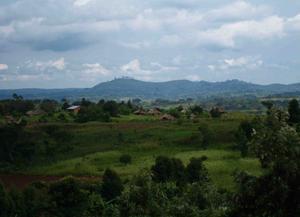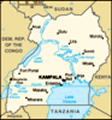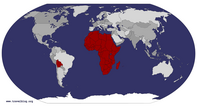Advertisement
Published: August 28th 2006

 Nebbi District
Nebbi District
This is a view of the Nebbi District and in the horizon you can see the DRC.
After almost two months in Kampala I was finally in the field from the 14th to 19th of August. To secure a substantial position in international development you are almost required to have field experience. For those of us living in the states, the field constitutes anything outside U.S. border. However once you leave the states the definition of the field
changes. I came to Kampala to gain field
experience, but once here we are not in the field, it’s outside Kampala and once you get outside the city into a surrounding district the field becomes the very remote and rural areas, particularly those in the conflict regions of the north.
So as I was saying, I went to the field
, to be exact the West Nile located in northwest Uganda bordering the Democratic Republic of Congo (DRC) and the Sudan. I stayed in Arua District but was going to work in Arua and Nebbi Districts. I stayed in the Arua District’s centre, cleverly called Arua Town. My hotel was nice, with a small bar, restaurant and TV all located in the lobby, with power and hot water and clean towels each day. My hotel was away from the centre of town along a paved side street diagonal from the compound where Musenveni stays when he is in the district. Arua is small with one main street and many side streets lined with office buildings, shops and the occasional restaurant. The only cars you saw drove for the government or were hired by one of the many development organizations working in Arua and sported the organization’s logo on its door. Most people walk or ride bicycles, the bikes serve as taxis and each bike has a cushion attached to the back and the locals pay to catch rides around town. As you leave the centre of town the homes and buildings spread out and the landscape is decorated with tall grass, thick trees, rich red dirt roads and mud houses with straw roofs, but occasionally one house would be blessed with a corrugated metal for a roof. It was so nice to finally be out of the pollution, traffic and noise that characterizes Kampala and see other parts of the country and get a better perspective of this country, it’s population and the landscapes.
I travelled to the North by myself, but was

 Ajia - Focus Group One
Ajia - Focus Group One
These are the women who participated in the first focus group posing next to the UPHOLD vehicle. hosted by the UPHOLD office based in Arua Town. I was there to conduct focus group discussions on safe delivery practices and the role of culture in the update of reproductive health services in the West Nile region. The UNFPA estimates Uganda’s maternal mortality rate to be 880 deaths per 100,000 live births and its infant mortality rate to be 86.1 deaths per 1,000 live births. Although most Ugandan women utilise antenatal care many continue to deliver at home and without assistance. In Arua District, 96.4 percent of mothers attend antenatal care at least once, 67 percent make arrangements for the birth but only 33 of the 67 percent delivered from a health unit and 11.6 percent deliver without assistance. Anecdotal evidence identifies culture and belief systems as significant barriers to delivering in health centres. For example in Arua, one is considered a ‘woman’ if she can deliver at home and without assistance. So this study was to investigate the actual barriers to delivering in local health centres.
Monday, August 14 Arriving at 9:30am on Monday, I stopped quickly by my hotel before going to the UPHOLD offices to meet with the district’s focal person Onesmus
Dralega. He arranged for two moderators one from Arua and one from Nebbi and one translator to assist me during the week. Sarah, a community development officer, was my Arua moderator. Jame (pronounced Jane), also a community development officer moderated the two focus groups in Nebbi. Freda was my translator all week and also accompanied me on the key information interviews I conducted with midwives, local government officials and traditional birth attendants. We met that morning, spent some time training, reviewing the discussion guides and clearing up any confusions before setting out to have our first discussion that afternoon.
After lunch we set off to Ajia (pronounced Ah-gee-uh) but when we arrived at the local health centre there were close to 30 women waiting, entirely too many.
Side note- the health centres were NOT supposed to be involved in order to protect against bias and present ourselves as independent as possible, but as working in Africa requires extreme flexibility we adjusted and carried on. The large number of women present presented quite a problem since we required no more than 12 although the explicit written instructions for what we required were evidently lost in communication. I hated this
because we have unnecessarily taken women away from their homes and responsibilities only to wait around all day and eventually be sent home, I mean they arrived in the morning and we did not arrive until after 3:00pm.
All in all, once we got situated and started it went smoothly. The women were very open, talkative and even demonstrated some local customs regarding where the family stands and how they assist during labour. Upon completion we chatted, thanked each other and took some photos. They were enthusiastic, laughing, carrying on and enjoying the opportunity to share their personal opinions and experiences.
Tuesday, August 15 We had one focus group in Rikki Sub-county in Arua on Tuesday. Again we encountered the women at the health centre, did anyone read the instructions? But it was good that we only had nine in attendance this time. Although still outside the health centre we moved over to a spot under a nearby tree about 100 meters away to talk. The women were quieter this time, timid even, but the information and honesty was remarkable and we felt that the information we received was valid and accurate. The rest of Tuesday was spent back in Arua we had lunch and then I had some meetings. I actually met with the equivalent of the governor of Arua, who was quite gracious and I was quite underdressed considering I did not realize a meeting with governor was in store.
Every time you call on someone or visit their office or place of business in Africa you are asked to sign their guestbook (at least this is relevant to The Gambia and Uganda). It’s a rectangular book, with either a blue or black cover and sections inside to hold your name, address, phone number and your comments- my generic comment is
Thank you for receiving us
. It’s a funny custom because I am not sure the explicit purpose other than to be a reminder of who has come in and out of your office, I mean even if you do not have real business but are just calling to inquire or ask a quick question they still insist that you sign the guest book. It’s one of many formalities in Uganda.
Wednesday, August 16 We set off early Wednesday morning for Nebbi district; we had two focus groups scheduled in two REMOTE villages bordering the DRC, Jang-okoro and Erussi. Driving towards the Congo border the landscape changed, slightly but at the same time noticeably. It was very hilly or had very small mountains I am not sure what is more accurate. But the roads were dustier, steeper and wound up and down the tall hills/ short mountains, the roads were narrow and I think we passed a total of three other (development) vehicles all day.
The focus groups went well, it took about 2 hours to arrive at the first one driving from Nebbi Town and from the first group to the second group about 3 hours on back roads with few small clusters of homes every 10-15 minutes or more. Most of the day was actually spent in the car riding around, which I quite enjoyed as it afforded me more time to watch the countryside. At one point we were driving up a tall hill/ short mountains and one our right was the Congo and on our left Uganda, we were on the border but the only visible demarcation was the road. Although the West Nile region is safe now and is not plagued by incursions from the LRA, locals warn again crossing into the DRC and the rebels that reside along the borders. However it is common for women from the DRC to come to Uganda for health services and vice versa.
Thursday and Friday, August 17-18 Thursday and Friday were reserved for key informant interviews to gain additional insight and perspective on why women deliver at home, to gain a better understanding of how the reproductive health system worked and to observe some of the local health centres. I interviewed the Senior Nursing Officer in Charge of Reproductive Health for Arua District, a few midwives and a traditional birth attendant. I didn’t get as many interviews conducted as I had planned but then again you cannot depend on plans here because it seems they are ever stuck to. Rather than setting up interviews and meetings for me ahead of time I had to meet with the Senior Nursing officer Thursday morning and request
suggestions
on where to go. She recommended a few health centres of various calibre. The problem with not having arranged appointments combined with bad roads means that everything takes two to three times longer than it should. For example on more than one occasion we arrived at a health centre but the midwife was not present, and no one could explain why or had any method to contact her. At one health centre
no one was present expect for the watchman who was hanging out at his friends place across the street. It took about thirty minutes to round anyone up associated the health centre but neither the nurse or midwife was available or even in the village this particular afternoon. So between long drives and long waits I eventually completed a handful, albeit small, but informative interviews.
The study was successful; I received exciting news upon my return to Kampala. The abstract from which I based this study was accepted at Makerere University’s Scientific Medicine Conference so I am compiling to the findings and getting a presentation together to be presented by an UPHOLD staff member. What was interesting about the results was how the fact that women do not use the health centre had little or nothing to do with culture. Although traditional and cultural practices still exist they do not prevent women from delivering at the health centre. Women gave reasons ranging form long distance, lack of transport and poor attitudes of the midwives, or being treated poorly by the midwives. The health centres are minimally equipped. When women deliver at the centre they have to bring their own supplies: two new razor blades, clean cloths, clean clothes, a basin, cotton/wool and a new blanket. So besides the lack of transport and having to walk a two to five or more kilometres or be driven on a bicycle there are other costs. On the other hand the midwives and health professionals point the finger to culture. So at the end of the day there is a huge disconnect between the service providers and the patients, but the real issue here is services. Which is not surprising when in Arua district only 38 percent of the health centres are fully staffed, most are overworked and underpaid, they centres cannot even provide supplies to the women, furthermore without adequate antenatal and postnatal beds many women resort the lying on the concrete while in labour and waiting to deliver.
In development it is very difficult to reconcile the fact that you are not going to be able to change the situation faced by these women that the hurdles are too big and the issues involved out of your hands. Although you can put in your efforts and try to give a forum for some people’s voices and hope someone else is listening, which is very idealistic I realize but until you are in a position to influence the powers that be you have to accept the limited agency you really have, and be content with doing the most you can with what is on your plate. But it’s still rewarding, inspiring and makes you want to work towards a point wherein you may be able to do a little more with who and what you have access to.
Advertisement
Tot: 0.297s; Tpl: 0.028s; cc: 9; qc: 59; dbt: 0.158s; 1; m:domysql w:travelblog (10.17.0.13); sld: 2;
; mem: 1.2mb









